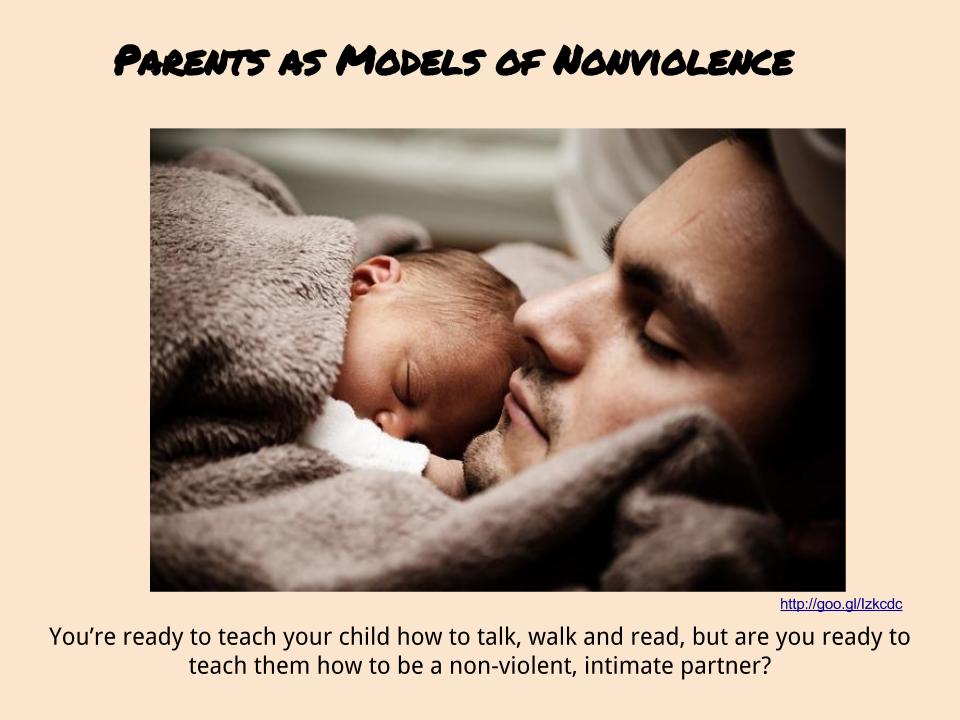|
5/17/2014 Parents as Models of NonviolenceBy Sara Forcella, See the Triumph Contributor
We expect parents to teach children how to walk, talk and read, but do we ever think about what parents’ intimate relationships teach their children? For better or for worse, parents play a large role in teaching their children how to behave and function within the context of intimate relationships. If you have been following our blogs at See the Triumph, than I am sure by now you know that intimate partner violence (IPV) is a serious, preventable public health concern that affects millions of people around the world. IPV is serious-- it can lead to low self esteem, anxiety, depression, homelessness, physical injuries and even death. However, it can also be prevented! In order to help prevent IPV we must understand some of its underlying causes. There are many different theories of what fosters the development of intimate partner violence, one of these is the Social Learning Theory. This theory suggests that intimate partner violence is a learned behavior. Children learn violent patterns of behavior at home or from our culture, which models, rewards and supports violence against others (Wolfe & Jaffe, 1999). In much the same way that children learn language and decision-making skills, they may learn how to abuse others (Wolfe & Jaffe, 1999). Therefore, parents have a major responsibility to teach their children how to act in intimate relationships. When family members or other role models use abusive behaviors, children begin to model these behaviors. The National Coalition Against Domestic Violence states that “witnessing violence between one’s parents or caretakers is the strongest risk factor of transmitting violent behavior from one generation to the next.” Children also learn these behaviors through reinforcement and punishment (Wolfe & Jaffe, 1999). For instance, when a parent slaps their child when he or she does something wrong, this child may learn that it is appropriate to lash out against others to punish them. Teaching children about IPV is a continuous process. When adolescents begin dating, parents can encourage them to be quality and caring partners. It’s important to teach teens what is and is not acceptable in dating relationships. Teaching children and teens the skills necessary to foster and maintain a healthy, non-violent, intimate relationship is crucial for their well being! Here are some suggestions for helping to prevent your child from becoming a victim or perpetrator of IPV: Provide Them with Safe Homes: Children who live in homes where IPV occurs are more likely to become a victim or perpetrator even if they are not being abused. Witnessing a parent being abused is traumatic--it can also teach children that abuse is an acceptable way to deal with partners. Model Nonviolent Behaviors: Teach your children how to deal with stress and anger. Just as you would show them how to brush their teeth, show them how you handle conflict in constructive ways. Teach them how to communicate with others without using physical, emotional, or verbal abusive. Speak to and treat your partner, children, and others with respect and tolerance. Fight Gender Stereotypes: In today’s society, children face much pressure to fit into typical gender stereotypes--girls are told to be sensitive and quiet, while boys are told to be aggressive and strong. Gender is socially created; therefore, not all girls and boys will act these specific ways. It’s important for parents to encourage both their boys and girls to be caring, compassionate members of society. Putting strict labels on how young men are expected to act sometimes reinforces the ideal that to be man they have to be aggressive or violent. Ideologies like this reinforce that violence against women is acceptable. Speak Up: Talk to your children about IPV, and don’t assume that they are too young to understand what it is. Teach your children that abuse is never OK. Keep Lines Of Communication Open: Make sure that your children feel safe and supported. Encourage them to ask questions and speak to you when they are concerned or confused about something that’s taking place in their or a peer’s relationship. Be Supportive and Loving: Make your child feel loved and proud of who they are! Support and encourage them to develop into creative, caring, confident and compassionate individuals. References Wolfe, D. A., & Jaffe, P. G. (1999). Emerging Strategies in the Prevention of Domestic Violence (3rd ed., Vol. 9 ). Comments are closed.
|
Archives
April 2024
CategoriesAll About Intimate Partner Violence About Intimate Partner Violence Advocacy Ambassadors Children Churches College Campuses Cultural Issues Domestic Violence Awareness Month Financial Recovery How To Help A Friend Human Rights Human-rights Immigrants International Media Overcoming Past Abuse Overcoming-past-abuse Parenting Prevention Resources For Survivors Safe Relationships Following Abuse Schools Selfcare Self-care Sexual Assault Sexuality Social Justice Social-justice Stigma Supporting Survivors Survivor Quotes Survivor-quotes Survivor Stories Teen Dating Violence Trafficking Transformative-approaches |
Search by typing & pressing enter



 RSS Feed
RSS Feed